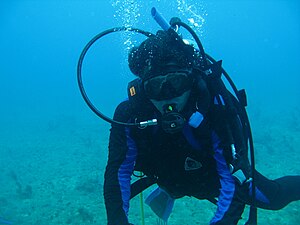 Image via Wikipedia
Image via Wikipedia
SCUBA diving is a fast-growing, recreational sport that can generally be enjoyed by anyone over 12. Thanks to the world-famous explorer, oceanographer and inventor, Jacques Cousteau, we can easily explore the incredible undersea world. Scuba diving is now a multi-billion dollar recreational family activity, and is continuing to increase in popularity at an exponential rate.
About 70% of the Earth is covered with water, and 97% of that water is salt water – the oceans and seas.
In the early 1700’s, diving bells and large, bulky, sealed suits were developed which used air pumped from the surface to allow divers to spend a limited amount of time under the surface at a limited depth. In the 1940’s, Jacques Cousteau developed the Aqua Lung which allowed for a controlled flow of air under the water from pressurized air tanks.
New scuba divers often find it gross that spitting into your mask is the accepted way of stopping it fogging up at depth. You can buy inexpensive
de-fogging solutions which professionals often refer to as spit-in-a-bottle.
Objects appear significantly larger underwater – so yes, you do look fat in that wetsuit.
Sharks don't like the taste of rubber, so always wear a
wetsuit. Most sharks are more scared of you than you are of them, so don't panic if you see one. Sharks don't fill out questionnaires on their tastes and fears so both of the above facts could be wrong – proceed with caution!
Scuba diver Michael Proudfoot was diving in a wreck in Baja California, Mexico in 1991, when he accidentally smashed his regulator and lost all his air. He survived for two days in a bubble of air trapped in the ship's galley. There was even a tea urn full of fresh water for him to drink (but no tea). He snacked on sea urchins while waiting to be rescued.
A dance class of 74 scuba divers created a world record on October 27, 2006 at Olympic Park Aquatic Centre in Sydney Australia by dancing simultaneously for ten minutes. No one is yet sure why.
You can use your scuba diving qualifications as college credit for some courses. Who says college has to be hard work? (You'll need an official transcript from the organization that trained you – contact them to find out more.)
Ron Taylor invented a chain mail suit of armour to protect from shark bites and then tried to find out if it worked by letting a shark bite him. It worked, but was too heavy. Perhaps he should have worked out the heavy part first!
Whale sharks have a scary name and are the biggest fish in the ocean, but apparently they're scared of scuba bubbles (at least that's the explanation that locals in Exmouth, Western Australia offered as to why they seem happy to swim
with
snorkelers but are wary of scuba divers).
Coral is a living organism which means that Australia's Great Barrier Reef
is arguably the largest living thing on earth.
Australian divers Ron and Valerie Taylor love to swim with Great White sharks, and were the first people to swim with the sharks without a cage and not be eaten.
Underwater weddings are offered by many companies around the world. The couples and guests can wear traditional wedding attire or wet suits. Vows are written on a dive slate, and the vows are 'said' by pointing at the words on the slate.
There are some 5,300 PADI (Professional Association of Dive Instructors) Dive centres operating in 180 countries, and NAUI (National Association of Underwater Instructors) claims to have tens of thousands of affiliated members, stores and service centres around the world.
If you dive with a cold or sinus problems it may be painful. More importantly, if you sneeze into your
mask at depth the gross factor of having to spit in it will pale into insignificance.
Richard Presley spent 69 days and 19 minutes in an underwater module in a lagoon off Key Largo, Florida, in 1992, setting the record for the longest deep dive. His endurance test was carried out as part of Project Atlantis, which aimed to explore human tolerance to life in an underwater environment.
Have you ever seen those beetles that skate around in circles on top of the water in ponds and lakes? If you watch them long enough, you may see them dive under the water. When they do this, they take a bubble of air with them that gets trapped between their body and wing covers. They breathe this air while underwater, then come to the surface again when they need more.
The deepest dive using scuba gear is held by Jim Bowden of the United States. In 1994 he dived to a depth of 1,000 feet in the freshwater Zacatoa Cave in Mexico.
The most valuable shipwreck was discovered by the late Mel Fisher, a famous 20th-century treasure hunter. In 1985, Mel found the Nuestra Senora de Atocha off the Key West coast of Florida. The ship carried 36 tons of gold and silver, and 70 lbs. of emeralds when it went down in a hurricane in September of 1622.
Freedivers (those holding their breath) in Japan and Korea today still dive for oysters, edible shellfish and seaweed. Except for the lead weights carried on their belts and their glass face masks, these divers work in the same manner as did their ancestors thousands of years ago. Most of these modern divers are women. They can stay underwater longer and are better able to withstand the cold than can men. Divers of the Japanese Ama culture can spend four or five minutes underwater, and have been known to reach depths of 150 feet.
And last but not least-----You will never look graceful walking on land wearing a pair of fins – especially if you're also wearing full scuba gear!!!!
Kathy Dowsett
www.kirkscubagear.com
The last of the Sea Nomads
 Image via Wikipedia
Image via Wikipedia



